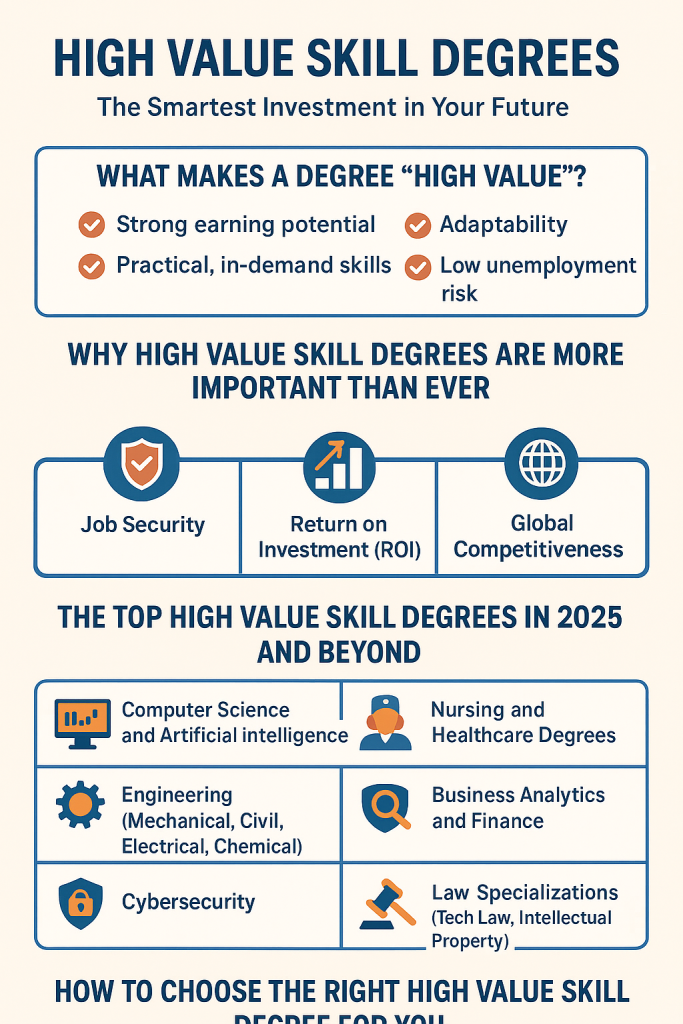Introduction
When it comes to higher education, not all degrees are created equal. Some open doors to high-paying jobs, rapid career growth, and long-term security, while others may leave graduates struggling with debt and limited opportunities. That’s why more students and professionals are asking: What are the best high value skill degrees today?
High value skill degrees combine specialized expertise with practical skills employers demand. They not only increase earning potential but also provide resilience in uncertain job markets. With automation, globalization, and AI reshaping industries, choosing a degree that delivers measurable return on investment (ROI) is more important than ever. In this pillar guide, we’ll explore the top high value skill degrees, why they matter, and how they can transform your future.
What Makes a Degree “High Value”?
A high value skill degree is one that provides a balance of:
- Strong earning potential – High average salaries compared to the cost of education.
- Practical, in-demand skills – Employers actively seek graduates with these competencies.
- Adaptability – Skills that transfer across industries and future-proof careers.
- Low unemployment risk – Stable demand across economic cycles.
According to a Georgetown University Center on Education and the Workforce report, the choice of major can account for more than a $3 million lifetime earnings difference between graduates. Clearly, picking the right degree is one of the most impactful decisions of your career.
Why High Value Skill Degrees Are More Important Than Ever
The modern job market is evolving at lightning speed. Automation and artificial intelligence are taking over repetitive tasks, and industries are transforming faster than universities can update curricula. Here’s why investing in a high value skill degree matters:
- Job Security – Degrees tied to fields like healthcare, engineering, and technology often face strong demand regardless of economic cycles.
- Return on Investment (ROI) – Rising tuition costs make it critical to choose degrees with strong income potential.
- Global Competitiveness – Skills in data, technology, and applied sciences translate worldwide, giving graduates global career options.
- Career Flexibility – High value degrees often build transferable skills that allow professionals to pivot across industries.
The Top High Value Skill Degrees in 2025 and Beyond
Let’s break down the leading high value skill degrees, the skills they develop, and the careers they open up.
1. Computer Science and Artificial Intelligence
Why it’s valuable:
The demand for AI specialists, data scientists, and software developers continues to explode. According to the U.S. Bureau of Labor Statistics (BLS), computer and information technology jobs are projected to grow 15% between 2021 and 2031—much faster than the average for all occupations.
Key Skills Learned:
- Programming (Python, Java, C++)
- Machine learning and AI model development
- Data structures and algorithms
- Cloud computing
- Cybersecurity principles
High-Paying Careers:
- AI Engineer (average salary: $140,000+)
- Software Developer (average salary: $110,000)
- Data Scientist (average salary: $120,000)
Study Reference:
A World Economic Forum report predicts AI and automation could create 97 million new roles globally by 2030. Computer science graduates are best positioned to fill these opportunities.
2. Nursing and Healthcare Degrees
Why it’s valuable:
Healthcare is one of the most resilient industries. With aging populations worldwide, nursing, physician assistant, and public health degrees are some of the most future-proof careers available.
Key Skills Learned:
- Patient care and clinical procedures
- Medical ethics and communication
- Critical thinking in healthcare settings
- Leadership in health systems
High-Paying Careers:
- Nurse Practitioner (median salary: $124,000)
- Physician Assistant (median salary: $121,000)
- Healthcare Administrator (median salary: $104,000)
Study Reference:
According to the BLS, healthcare occupations are projected to grow 13% from 2021 to 2031, creating over 2 million new jobs.
3. Engineering (Mechanical, Civil, Electrical, Chemical)
Why it’s valuable:
Engineers design and build the infrastructure, systems, and technologies that power society. With applications spanning energy, aerospace, manufacturing, and technology, engineering degrees offer high salaries and job security.
Key Skills Learned:
- Systems design and problem-solving
- CAD and modeling software
- Project management
- Applied mathematics and physics
High-Paying Careers:
- Petroleum Engineer (average salary: $137,000)
- Electrical Engineer (average salary: $100,000)
- Civil Engineer (average salary: $88,000)
Study Reference:
The National Association of Colleges and Employers (NACE) consistently ranks engineering majors among the top earners for starting salaries.
4. Business Analytics and Finance
Why it’s valuable:
Organizations need professionals who can make data-driven financial decisions. Business analytics and finance degrees combine mathematics, economics, and data science, offering some of the highest ROI in higher education.
Key Skills Learned:
- Financial modeling
- Business intelligence tools
- Risk management
- Investment analysis
High-Paying Careers:
- Financial Analyst (median salary: $96,000)
- Quantitative Analyst (average salary: $120,000)
- Business Intelligence Analyst (average salary: $105,000)
Study Reference:
A PwC survey found that 67% of companies now use data-driven insights for decision-making, increasing demand for graduates with finance and analytics expertise.
5. Cybersecurity
Why it’s valuable:
Cyberattacks are one of the biggest threats to governments, corporations, and individuals. Cybersecurity degrees provide job security and high pay, with demand skyrocketing.
Key Skills Learned:
- Network security
- Ethical hacking
- Digital forensics
- Cloud security
High-Paying Careers:
- Cybersecurity Analyst (median salary: $102,000)
- Information Security Manager (average salary: $130,000)
- Penetration Tester (average salary: $115,000)
Study Reference:
Cybersecurity Ventures estimates that global cybercrime damages will cost $10.5 trillion annually by 2025, making cybersecurity graduates essential.
6. Law with Specializations (Tech Law, Intellectual Property)
Why it’s valuable:
Law degrees remain powerful, especially when paired with specializations in technology, data privacy, or intellectual property. With global digital transformation, tech-savvy lawyers are in high demand.
Key Skills Learned:
- Legal research and analysis
- Contract negotiation
- Technology regulation
- Intellectual property law
High-Paying Careers:
- Corporate Lawyer (average salary: $135,000)
- IP Attorney (average salary: $150,000)
- Tech Policy Analyst (average salary: $120,000)
7. Education with STEM or EdTech Focus
Why it’s valuable:
Education is transforming with digital platforms and AI-based tools. Degrees in STEM education or educational technology give graduates high value in shaping future learning.
Key Skills Learned:
- Curriculum development
- Instructional technology
- Data-driven learning models
- Online education management
High-Paying Careers:
- Instructional Coordinator (median salary: $70,000)
- EdTech Specialist (average salary: $85,000)
- STEM Teacher (varies: $55,000–$90,000+)
Comparing ROI of High Value Skill Degrees
| Degree | Average Cost | Median Starting Salary | Long-Term ROI | Risk Level |
|---|---|---|---|---|
| Computer Science | $40,000 | $75,000 | Very High | Low |
| Nursing | $35,000 | $70,000 | High | Very Low |
| Engineering | $50,000 | $72,000 | Very High | Low |
| Finance/Analytics | $45,000 | $68,000 | High | Medium |
| Cybersecurity | $38,000 | $72,000 | Very High | Very Low |
| Law (Tech/IP) | $80,000 | $90,000 | High | Medium |
| Education (EdTech/STEM) | $30,000 | $55,000 | Medium | Low |
How to Choose the Right High Value Skill Degree for You
- Assess Your Strengths – Analytical? Consider engineering or finance. Creative problem-solver? Computer science or law may fit better.
- Research Job Outlook – Check demand projections through BLS, OECD, or LinkedIn’s Emerging Jobs Report.
- Consider Flexibility – Select degrees with skills transferable across industries.
- Calculate ROI – Compare tuition, time to degree, and potential salaries.
- Think Long-Term – Choose skills aligned with future trends (AI, renewable energy, cybersecurity).
Studies Proving the Value of High Value Skill Degrees
- Georgetown University (2019) – STEM, business, and healthcare majors rank among the highest earning fields.
- OECD (2022) – Digital skills are projected to be required in 90% of jobs within the next decade.
- World Economic Forum (2023) – 44% of workers’ skills will change in the next five years due to AI and automation.
Conclusion: Future-Proofing Your Career
The world is changing faster than ever, and education must adapt. High value skill degrees are not just about making money—they’re about building resilience, adaptability, and purpose in your career. Whether you choose computer science, nursing, engineering, finance, cybersecurity, or education with a tech focus, you’re investing in skills that will remain relevant for decades.
Choosing the right degree today could mean financial freedom, career satisfaction, and long-term security tomorrow. Don’t just chase trends—focus on degrees that combine passion with practicality. That’s the true definition of a high value skill degree.
check out https://www.coursera.org/articles/high-income-skills
check out https://koaladash.com/importance-of-developing-high-value-skills/



